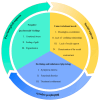Experiences of Social Isolation in Older Adults with Chronic Diseases: A Qualitative Study Based on Patients' Perspectives
- PMID: 40281851
- PMCID: PMC12027320
- DOI: 10.3390/healthcare13080902
Experiences of Social Isolation in Older Adults with Chronic Diseases: A Qualitative Study Based on Patients' Perspectives
Abstract
Objective: This study aimed to understand the causes of social isolation among older adults with chronic diseases. Methods: In-depth semi-structured interviews were conducted with 20 older adults with chronic diseases, and thematic and interpretative phenomenological analyses were used in order to fully understand the psychosocial and behavioral changes following diagnosis. Results: People with severe social isolation described their life journeys after falling ill, and potential influencing factors for social isolation were identified. We identified three themes across biology, psychology, and sociology: declining and imbalanced physiology, negative psychosocial feelings, and unmet relational needs. The biological aspect includes symptom distress, functional disorder, and treatment confinement. The psychological aspect includes emotional stress, feelings of guilt, and stigmatization. The sociological aspect includes meaningless socialization, a lack of confiding relationships, a lack of social support, and the deterioration of the social environment. Conclusions: Better identifying the factors and needs that affect social isolation among this population will be invaluable for healthcare professionals and researchers.
Keywords: chronic disease; older adults; qualitative research; social isolation.
Conflict of interest statement
The authors declare no conflict of interest.
Figures
Similar articles
-
The psychosocial experiences of women with breast cancer across the lifespan: a systematic review protocol.JBI Database System Rev Implement Rep. 2015 Jan;13(1):112-21. doi: 10.11124/jbisrir-2015-1795. JBI Database System Rev Implement Rep. 2015. PMID: 26447012
-
Palliative care experiences of adult cancer patients from ethnocultural groups: a qualitative systematic review protocol.JBI Database System Rev Implement Rep. 2015 Jan;13(1):99-111. doi: 10.11124/jbisrir-2015-1809. JBI Database System Rev Implement Rep. 2015. PMID: 26447011
-
The impact of information technology applications on the quality of life of disabled older adults in nursing homes in China: a qualitative study.Front Public Health. 2025 Apr 7;13:1560306. doi: 10.3389/fpubh.2025.1560306. eCollection 2025. Front Public Health. 2025. PMID: 40260168 Free PMC article.
-
Impact of interventions to improve recovery of older adults following planned hospital admission on quality-of-life following discharge: linked-evidence synthesis.Health Soc Care Deliv Res. 2023 Nov;11(23):1-164. doi: 10.3310/GHTY5117. Health Soc Care Deliv Res. 2023. PMID: 38140881
-
Quality of life and unmet needs in patients with fabry disease: a qualitative study.Orphanet J Rare Dis. 2024 Oct 18;19(1):389. doi: 10.1186/s13023-024-03412-6. Orphanet J Rare Dis. 2024. PMID: 39425141 Free PMC article. Review.
References
-
- Centers for Disease Control and Prevention About Chronic Diseases. [(accessed on 3 March 2021)]; Available online: https://www.cdc.gov/chronic-disease/about/index.html.
Grants and funding
LinkOut - more resources
Full Text Sources


